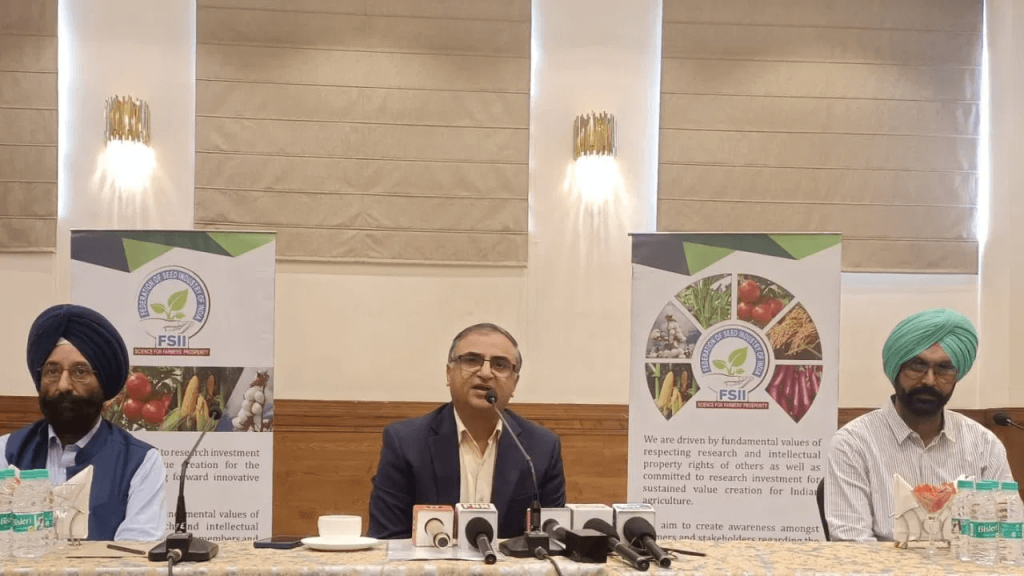Tags
High-Yielding & Stress-Tolerant Seed Varieties can Enhance Productivity by upto 15-20%: Industry leaders
Industry leaders at the FSII meet in Chandigarh urged Punjab to adopt high-yield, stress-tolerant rice varieties to enhance productivity and sustainability, highlighting the need for policy support and farmer education.
KJ Staff

To address the challenges of rice productivity in Punjab and ensure the rice bowl of the country retains its pride, industry leaders on October 29, 2024, called for a comprehensive review of production practices and policy framework. Urging mass adoption of high-yielding and stress-tolerant seed varieties, the industry leaders said that with a projected requirement of 136-150 million tonnes of rice by 2031, the region’s farming practices are under pressure to modernize in ways that prioritize resource conservation, food security, and farmer welfare.
Seed industry leaders had gathered to discuss pathways for sustainable rice production at a press meet organized by the Federation of Seed Industry of India (FSII) in Zirakpur, Chandigarh.
Punjab contributes close to a quarter of India’s rice production, yet the state’s agricultural practices are largely dependent on high water and fertilizer input, which are increasingly unsustainable. “Rice production in Punjab is in urgent need of a transformation,” said Ajai Rana, FSII Chairman and CEO & MD of Savannah Seeds. “To meet future demand while conserving resources, sustainable rice farming must start at the seed level, with varieties designed to deliver higher yields with fewer inputs. Currently, out of 75 lakh acres of total rice acreage, high-yielding cross-bred rice is cultivated only on 3 to 3.5 lakh acres. With such a small area currently under cultivation, there’s significant room for expanding these varieties to enhance rice production without necessarily increasing the land under cultivation.”
Hybrid rice varieties also meet milling recovery standards and broken percentage requirements set by the Food Corporation of India (FCI), ensuring both efficiency and quality in post-harvest processing. “This compliance with approved norms allows farmers to achieve superior grain quality, making hybrid rice an attractive choice for high-yield and quality-conscious farming,” said Rana.
According to studies, high-yielding and stress-tolerant rice varieties can increase yields by up to 15-20% while using 30% less water, a critical factor given Punjab’s declining groundwater levels. “Farmers need access to seeds that offer resilience against climatic stresses and reduce dependency on water and chemicals because that’s the foundation of sustainable farming,” Rana noted. Hybrid rice is a proven technology, widely adopted in the USA, China, and leading rice-producing states in India. This technology offers Indian farmers a reliable, high-yielding alternative that supports sustainable farming practices and aligns with global standards in rice production.
Hybrid rice offers a promising solution to the challenges of depleting water tables and stubble burning. Additionally, their quicker maturation provides farmers with a longer window after harvest, allowing for more effective stubble management and reducing the need for burning.
During the meet, FSII leaders highlighted advancements in seed technology as central to improving rice production’s sustainability. “By focusing on breeding innovations, we are equipping farmers with seeds that are not only high-yielding but also climate-resilient,” explained Baljinder Singh Nandra, Member FSII, Vice President, Govt. & Regulatory Affairs, SeedWorks International Pvt Ltd.
However, implementing these sustainable solutions comes with challenges, especially in Punjab, where traditional farming methods are deeply rooted. “One of the biggest obstacles is creating an enabling environment that supports innovation and helps farmers transition smoothly to these advanced seed varieties,” explained Singh. He stressed that policy support is crucial to incentivize farmers, as adoption costs can be prohibitive for smallholders.
Punjab’s farmers, who produce nearly 12.5 million tonnes of rice annually, also face challenges in terms of perception. Many are wary of adopting unfamiliar seeds and technologies, fearing yield instability or higher costs. “Adoption of new varieties needs to be a well-supported journey for farmers, with education and field demonstrations,” said Singh. “Enabling policies could provide subsidies or credits to reduce costs, while partnerships with agri-tech companies can offer training to ease this transition.”
Hybrid Rice Farmer Paramjit Singh, from Rashidpur village, Punjab present at the event, highlighted the perspective from the ground. “It’s difficult for small farmers like us to take on the risks associated with new seeds and techniques without strong support. Training, financial help, and scientific insights from industry experts are vital for us to adopt these sustainable methods,” he shared.
To drive sustainable rice production, FSII leaders called for a collaborative approach between the government, research institutions, and private sector players. Policy reforms could stimulate adoption by incentivizing research in seed development and easing access to technology for small-scale farmers. If policies can be implemented which encourage innovation, ease seed variety registration, and provide subsidies, it would make sustainable practices more accessible and appealing to farmers.
https://krishijagran.com/news/high-yielding-stress-tolerant-seed-varieties-can-enhance-productivity-by-upto-15-20-industry-leaders/Published Date: November 4, 2024






